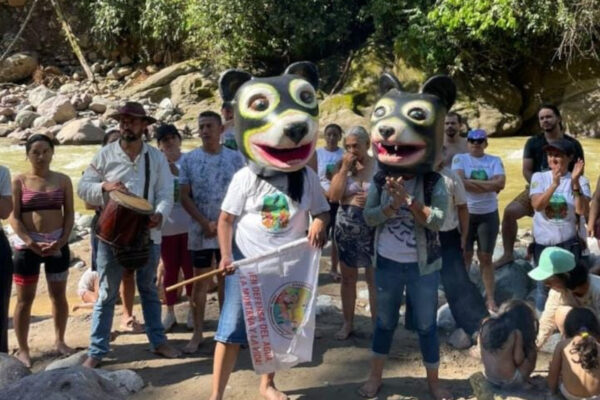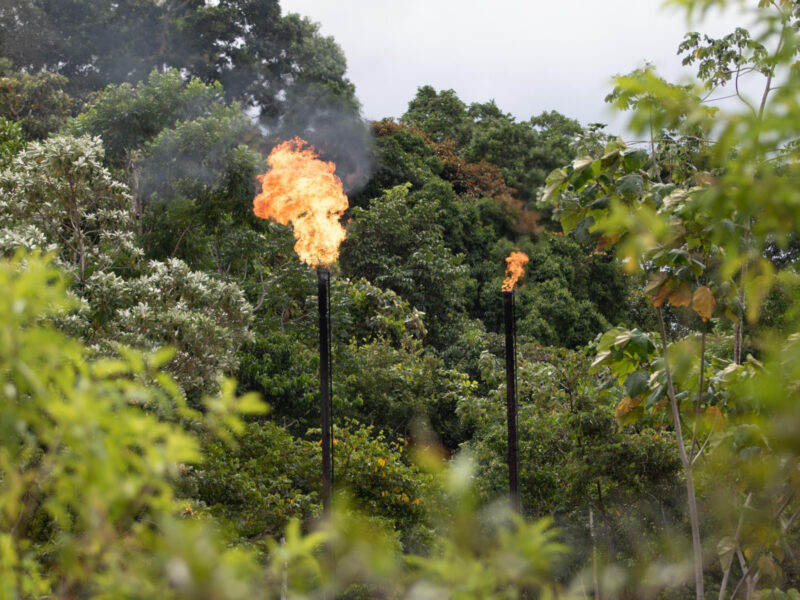In the face of mounting environmental and rights concerns, the Peruvian Federation of the Achuar Nationality (FENAP), the Autonomous Territorial Government of the Wampís Nation (GTANW), and the Cabo Blanco Fishing Association are targeting the potential financial investment by the Italian export credit agency, Servizi Assicurativi del Commercio Estero (SACE), in Petroperú.
Amazon Watch and Italian NGO REcommon are campaigning against SACE in support of grassroots efforts to oppose this potential partnership. Pressuring SACE presents a strategic opportunity to halt the expansion of oil companies into the Amazon and Peruvian coast, and to hold Petroperú accountable for necessary environmental remediation and community reparations.
As one of the most biodiverse regions on the planet, the Amazon rainforest is under constant threat from the extraction and exploitation of fossil fuels. Fisher communities along the Peruvian coast are strong allies in the movement toward a just transition away from reliance on fossil fuels. By focusing on SACE’s potential investment in Petroperu, a state-owned oil company with significant operations in both regions, together we aim to disrupt the financial support necessary for further expansion, ultimately advocating for the protection and preservation of these delicate ecosystems.
On June 27, 2023, FENAP, GTANW and the Cabo Blanco Fishing Association sent the following letter to Italian credit export agency, SACE; and Italy’s Ministries of Finance, Foreign Affairs, and Cooperation:
June 27, 2023
To:
Servizi Assicurativi del Commercio Estero (SACE)
Italy’s Ministries of Finance, Foreign Affairs and International Cooperation
Re: Indigenous nations and Peruvian civil society demand Italian export credit agency, SACE, not finance or guarantee loans for Peruvian state-owned oil company Petroperú
The undersigned organizations – the Peruvian Federation of the Achuar Nationality (FENAP), the Autonomous Territorial Government of the Wampís Nation (GTANW), and the Cabo Blanco Fishing Association – respectfully write to the Italian credit export agency, SACE; and Italy’s Ministries of Finance, Foreign Affairs, and Cooperation, to immediately halt negotiations between SACE and Petroperú regarding the possible financial support of the company and its projects.
Petroperú is a state-owned oil company that mostly operates in the midstream and downstream business by transporting oil through the North Peruvian Pipeline (ONP) and refining it. However, Petroperú returned to the upstream business in 2021 by operating Block I, located in the north Peruvian coast, and may operate Blocks 64, 8 and 192 in the Peruvian Amazon, in partnership with other companies.
Despite Petroperú’s flagrant disregard for Indigenous peoples’ rights, human rights, and the environment, it has continued to operate due to the bankrolling of international financial institutions in Europe and the United States of America. Now, Petroperú hopes to convince financial institutions, such as SACE, of its viability and promise as a worthy investment. According to 2023 Petroperú’s First Quarter Report, Petroperú is in negotiations with SACE for a $500 million loan guarantee to support the Talara Refinery Modernization Project (PMRT), and support for short-term financing.
Petroperú’s history reveals a troubling pattern of alleged corruption, marred by financial difficulties and governance issues, as the company has cycled through five different presidents in less than a year. Petroperú falsely promotes the PMRT as a “green” and “sustainable” investment meant to make current production and refining “cleaner.” These claims are far from the truth, as any additional refining, exploration, or production that leads to increased carbon emissions will result in irreversible damage to people and the planet.
SACE’s potential support represents a grave risk to the rights of the Wampís, Achuar, and fishing communities, and serves as an alarming threat to Amazonian and aquatic ecosystems that are critical for sustaining all life on Earth. FENAP, GTANW, and the Cabo Blanco Fishing Association will resist Petroperú’s plans to operate on their territories, meaning that the company’s claims about future profits are unlikely to come to fruition.
Petroperú plunged into severe indebtedness from long-term loans and bonds to finance the PMRT, which cost $5.3 billion. PMRT’s capacity to process oil is at 95,000 barrels per day, far exceeding Peru’s crude oil production at 40,538 barrels per day. Since Petroperú’s crude production is very low the company will likely push to operate more oil concessions in the critical ecosystems of the Amazon and the North Peruvian coast. However, as mentioned, this push will be met with resistance, which will likely increase financial risks associated with the implementation of the project.
Operations in Blocks 64 and 192 are currently suspended because of community opposition and potential social conflicts. Block 64 overlaps with the territories of the Achuar and Wampís Nations, who have opposed all forms of oil operations since its creation in 1995. Block 192 overlaps with the Achuar from the Corrientes River, Kichwa, Quechua and Kukama communities that have agreed to oil operations on their territories under the condition that past oil impacts are remediated; however, remediation will be incredibly costly. Only Block I is in production, but only produces around 480 barrels of oil a day.
To feed the Talara refinery, Petroperú seeks to operate six additional oil blocks (V, VI_VII, X, Z-2B, XV, and II) located on the Peruvian coast. However, in Blocks X and Z-2B, the Cabo Blanco Fishing Association, which practices ancestral fishing, has been severely impacted by past oil operations. This community denounces any and all potential activities by Petroperú, and will oppose any oil activity.
Despite its impacts, Petroperú still desperately seeks financing to complete its projects and operate. However, any investment in Petroperú presents immense political, social, financial, and legal risks risks (more information can be found in the document, The Risks of Investing in Petroperú):
- Financial Risks: Petroperú’s is currently in a financial crisis, which may make it difficult for the company to pay even for daily corporate operations. Since Petroperú continues to face community opposition at oil blocks necessary to feed the refinery, the company’s claims about future profits are less likely to come to fruition. Given the financial risks associated with PMRT, the refinery may already be considered a stranded asset.
- Legal Risks: In Peru, Petroperú ranks as having the third most administrative sanctions among oil companies in Peru due to environmental impacts. It is currently involved in eight legal cases that represent approximately $5 million dollars in economic sanctions only for administrative processes and not all the other costs of remediation and compensation.
- Political Risks: Petroperú’s high-level executives are politically appointed and depend on the government in power. Petroperú has a history of alleged corruption scandals, crises, and judicial processes due to the mismanagement by these high-level executives. Peru has also experienced continuous political instability and crises over the last seven years.
- Social Risks: Petroperú’s operations, including the ONP, have caused innumerable environmental impacts as evidenced by reports. This situation has led to tense relationships with Indigenous communities, leading to significant community opposition and potential for future social conflicts.
Any financial institution that pours money into projects or companies that harm the Amazon actively contributes to harms to the Earth’s climate, the forests’ biodiversity, and livelihoods.
The Amazon rainforest is one of the most biodiverse places on Earth, home to over 400 distinct Indigenous peoples. Indigenous nations, for hundreds of years, have tended these lands, the forests, and its waters, and rely on its abundance for food and medicinal plants to ensure survival. Much of the forest remains intact because of ancestral knowledge passed down from generation to generation, playing a vital role in preserving imperative ecosystems.
The Amazon’s survival is also necessary for regulating the Earth’s climate, absorbing an estimated 2 billion metric tons of carbon dioxide from the atmosphere each year. However, the Amazon’s mass deforestation, exacerbated by unrelenting extraction, compromises the Amazon’s ability to absorb carbon and contributes to climate catastrophe. Continued financing of industrial activity that causes Amazon destruction will result in severe changes in weather around the world (such as intensified floods, heat waves, and droughts), acute food and water insecurity, and inevitable loss of life. This makes the survival of the Amazon rainforest, and its inhabitants, crucial to sustain processes which support all life on our planet. Indigenous nations vow to prevent its destruction.
Just as preserving the rainforests are essential for preventing climate disasters, protecting the seas and oceans also serve a similar purpose. Northern Peru’s coastal waters may be drastically affected as a result of financing of the Talara refinery. Artisanal fishing communities from the cultural heritage site of Cabo Blanco, rely on the biodiversity in coastal waters to practice ancestral fishing – a practice passed down for centuries. Once considered an emblematic paradise teeming with biodiversity, Cabo Blanco is now polluted by extensive oil production, leading to the destruction of marine ecosystems. These existing drilling sites, in addition to oil concessions on the coast, may feed the Talara Refinery. Any further investments in oil projects here could lead to disastrous consequences, compromising the sustenance and health of youth and future generations that reside there.
The transport of crude oil from the Amazon to the Peruvian coast, where the Talara refinery is located, will depend on the ONP, operated by Petroperú and known for frequent oil spills that contaminate rivers and soil. This pipeline has a history of 111 oil spills from 1997 to 2021, resulting in adverse environmental impacts and water contamination.
Italy signed the Glasgow Climate Pact in 2021, which pledged that its respective financial institutions would make plans to transition away from fossil fuels by 2022. Italy, despite being a signatory of this agreement, has attempted to support environmentally destructive fossil fuel and gas projects around the world and faced intense opposition from other frontline communities from the Democratic Republic of Congo, Uganda, Tanzania, Mozambique, and Vietnam.
To aggravate these harms, SACE and the Italian government have recently decided to break commitments made in Glasgow with the adoption of a weak Italian implementation policy. This policy exempts financing for midstream and downstream oil projects, should it support Italian energy security. However, we ask: how can backing a refinery in Peru, run by a company responsible for significant environmental and social issues, ensure Italian energy security?
In closing, SACE and other financial institutions that choose to support Petroperú and companies operating in the Amazon will contradict this commitment by supporting industries that intensify environmental degradation, contribute to climate chaos, and put lives in peril.
Therefore, we demand that SACE and the Italian government stop negotiations and refrain from providing any financing or loan guarantees to Petroperú and its projects.
Signatories
Peruvian Federation of the Achuar Nationality – FENAP
Autonomous Territorial Government of the Wampís Nation – GTANW
Cabo Blanco Fishing Association
Amazon Watch













